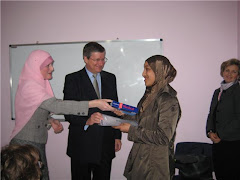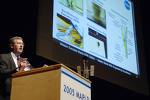
It is very important for me to ensure that the Medical English Programme at Hopeland Institute remains the most up-to-date and student focused course of it's kind. With this in mind, students are asked to provide an evaluation of the course including what they found good about it and which areas could be improved.
I am proud to include their responses in this post and look forward to working with their suggestions to inform further development of the programme. Thank you to those students who responded.
Student 1:First of all when I heard about something called Medical English I was surprised and very happy to know that there is such a thing in Algeria, I think that it leads to progress,it leads to be more open to the international community (share experiences,learn from each other...the language is not a barrier anymore),it also helps if/when u want to attend international conferences,use databanks,read articles in English,study abroad...When I came to Hopeland to study Medical English I saw the book and the programme and I loved it, but I knew that I'll not have enough time to come to class at Hopeland because of my studies and because I really wanted to do it and to get a degree in medical English I thought that I should probably think about using the book for self study, but when I came to class I really liked it ,it was not boring at all ,we did a lot of activities, we learn to work in team, we were free to talk ...
Ms Louise you added soooooo much to the course, you added sooo much to us as a MEDICAL English teacher, as an ENGLISH teacher and also as human , sincerely admire you for that.you're a hard worker, perfectionist, open minded and sooooooooooooo gentel .You were very patient to us, and I MEAN IT! You explain and repeat again and again, you never go mad when we make stupid mistakes; you encourage us to do better.you love people thats why they love you so much , actually your the only "foreigner “who says " I love Algeria, I love the weather and the people." Generally Algerians and foreiners are complaining of almost everything in this country!!!! that was what i liked the most about you as a person .now about you as Medical English teacher I'd say again your patience,then the fact that you understand and speak French I think its a big advantage, its very helpful to understand the common mistakes that we make (knowing that we (most of us if not all of us) speak French and THINK in French,thats why sometimes we use French words and expressions to say something in English and ur ability to understand that and deal with it is amazing)Mrs Louise YOU made this course more interresting,cuz you were not teching us just the equivalents of medical terms in English , you teached us HOW to produce the language (thats what you always say and that what you did).
I liked almost everything about the Medical English and you as a teacher ,I know that u're looking for constructive critisism but I really dont find something bad!mmmm or maybe one thing ,in my opinion we should do the ''over to you'' activities as a home work and give it back to you .thats my opinion thats all .
Student 2:For médical english, I think that your method is gratfull I sware, but if there is anything to add, I think that it will be better if there is more hours for reading and perhaps home work like researches about diseases or... , it helps the student to improve his english because I noticed when I was studying général english at another school 2 years before I began medical english at hopeland that I didn't remember anything when I finished my training so learning english is more easier when it is a way to search something or studying medecine for exemple, it's better to memorise. This is what I think, and I wish you a lot of success.
Student 3:there a lot that i want to tell you ...;in the first time i was stupified by ur appointement ...and ur energy ...i couldn't explain how you can think about everything even small details .... for me it was wonderful experience to get courses by someone like you .....and especially a native spearker ......i can't ignore that you have search for documents to teach us .....the blue book ..the red and the other ( the small one ) those are well orgonized and very useful ..... what i think could be done is to keep students talk more and more ..............like u said try to chooose hot subjects.......................... coz we dont talk a lot in english.... ur methotodology in teaching is perfect .....you respect high academic rules
in general that was very good experience .........and i want to thank you a lot for being always with us ... to feel what we've been feeling .....and to support us ......you keep us strong "i swear "
Student 4:The receptionists are kind and answer to all questions. The booking process is easy, your english is estimated, it is fast and it is not expensive.
It was a very interesting group, they were selected according to their medical and english knowledge therefore there was a good ambience. I was satisfied with the resources used during the course, there were many exercises, lots of grammar and vocabulary notes given to us, it was very helpful.
I often use the medical text book to revise my medical english Louise was wonderful with us. We improved our general english and learnt medical english with her, she made us discover the British culture, she gave us self-esteem and confidence with her encouragements.
For me, the timing of the course was perfect, working all week long, I had only my weekends to have class. Have been in that class make me very proud.
Student 5:I write this email to explain to you my feeling during the medical English courses.
The courses are very interesting but not attractive for me because of the program .
I think that during the inscription you should explain with details the contains of the program, because it’s not really what I’m looking for .I’m not doctor and I’m not student in medicine.
I feel myself very depressed when you explain to me that my level is down ,and that you have to follow the majority of students ( perhaps in public school ,not in private school !)
you can break the motivation of the students …
In this case you have to choice only people with THE level.
I keep thinking that 8 or 7 hours during one day per week is too much .2 *4 hs shoud be better to learn.
I learn a lot of thinks with you,and I spend good times.
You should just keep this word in your mind “motivation”,it’s very important to make people improve themselves.
Student 6:here are some points :- i noticed that the students' level of english affect negatively on the course,by wasting time in explanation of general english.- i hope to give big time to prononciation of medical words or if possible take as a course.- i think that it's better to have three courses a weed in stead of once 'cause chapters will be less which give students time to research easly.


















